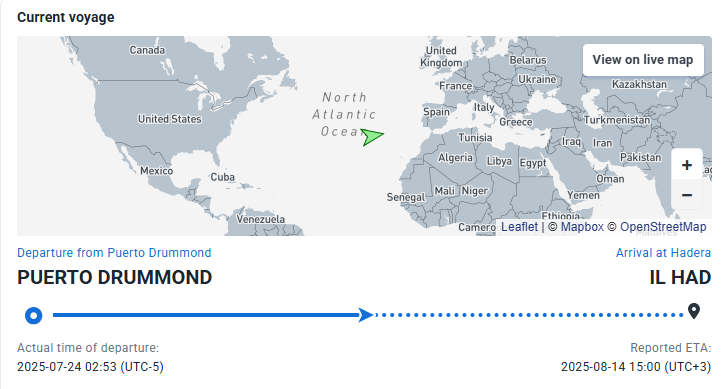Coal Bulk Carrier Intrudes on Israeli Route: Colombia Issues Naval Order! 希腊货船载煤闯“禁运”线!哥伦比亚威胁海军拦截
Coal Bulk Carrier Intrudes on Israeli Route: Colombia Issues Naval Order!
希腊货船载煤闯“禁运”线!哥伦比亚威胁海军拦截
A bulk carrier loaded with coal has become a focal point of controversy due to its planned route from Colombia to Israel. A Maltese activist group has identified the bulk carrier and called on the Maltese government, as the flag state of the vessel, to take action. Meanwhile, the Colombian government has also demanded action and threatened to use its navy to prevent such shipments in the future.
The Greek-owned, Malta-registered bulk carrier (with a deadweight tonnage of 182,620) departed from Colombia's Puerto Drummond. Currently located in the middle of the Atlantic Ocean, the vessel is en route to Israel's Hadera Port (HADERA / UN/LOCODE: ILHAD), with an estimated 10 days remaining until arrival. However, groups on both sides of the Atlantic have protested the ship's support for Israel.
一艘满载煤炭的散货船因计划从哥伦比亚驶往以色列而成为争议焦点。马耳他一个活动团体已识别出这艘散货船,并要求马耳他政府作为该船的船旗国采取行动。与此同时,哥伦比亚政府也要求采取行动,并威胁要动用海军阻止未来此类运输。
这艘希腊所有、在马耳他注册的散货船(182,620载重吨),从哥伦比亚的德拉蒙德港(Puerto Drummond)出发。目前该船位于大西洋中部,申报目的地为以色列哈代拉港(HADERA / UN/LOCODE: ILHAD),距抵达尚有10天航程。然而,大西洋两岸的团体均抗议该船对以色列的支持。

图源网络
The incident came to light following a complaint from the Colombian Mining Union. A year ago, Colombian President Gustavo Petro issued a decree banning coal exports and related trade with Israel due to the Gaza conflict. Colombia's Labor Minister, Antonio Sanguino, has received the complaint and called for an investigation, while coordinating with other organizations.
President Petro, in a social media post, described the coal shipment as a "challenge" to his government and convened a meeting with unions and relevant government departments. He warned, "The navy will be ordered to intercept all ships heading to Israel."
According to the Times of Malta, an activist organization has demanded that the Maltese government intervene, as the flag state of the vessel. The group has called on the Maltese government to order the ship to turn back and return the coal to Colombia. Failing that, they have urged Malta to revoke the vessel's flag registration.
The organization argues that Malta should follow the example of Antigua and Barbuda. As reported by the Times of Malta, the organization believes that this Caribbean flag state has set a standard for its registered vessels prohibiting trade with Israel.
This is not the first time activists have targeted merchant ships transporting goods to Israel. It has been reported that dockworkers in multiple ports have attempted to refuse handling ships bound for Israel. Previously, an Israeli cruise ship operating in the Mediterranean also faced protesters in several ports.
The ship's destination, Hadera Port in Israel, is the only specialized coal port in the country. It is the sole receiving port for all coal imports and supplies fuel for 40% of the nation's electricity generation.
事件曝光源于哥伦比亚矿业工会的投诉。一年前,哥伦比亚总统古斯塔沃·佩特罗(Gustavo Petro)因加沙冲突颁布法令,禁止向以色列出口煤炭及进行相关贸易。哥伦比亚劳工部长安东尼奥·桑吉诺(Antonio Sanguino)已收到投诉,并呼吁展开调查,同时与其他组织协同处理。
佩特罗总统在社交媒体上表示,此次煤炭运输是对其政府的“挑战”,并召集工会和政府相关部门开会。他威胁道:“海军将收到命令,拦截所有开往以色列的船只。”
《马耳他时报》(Times of Malta)报道称,一个活动组织已向马耳他政府发出要求,称其作为船旗国必须进行干预。该组织要求马耳他政府命令该船掉头并将煤炭运回哥伦比亚。若无法实现,则要求马耳他撤销该船的船旗注册。
该组织声称,马耳他应效仿安提瓜和巴布达的做法。据《马耳他时报》报道,该组织认为这个加勒比海地区的船旗国为其注册船只设定了禁止与以色列贸易的标准。
这并非活动人士首次针对向以色列运送货物的商船采取行动。据报道,多个港口的码头工人曾试图拒绝处理开往以色列的船只。此前,一艘在地中海运营的以色列邮轮也在多个港口遭遇抗议者。
这艘船的目的港为以色列哈代拉港,是以色列唯一专业化电煤港口。所有煤炭进口的唯一接收港,承担全国40%电力供应的燃料输入。
Hadera Port, Israel
Located on the central Mediterranean coast of Israel, at 32°28'N latitude and 34°53'E longitude, between the ports of Haifa and Tel Aviv (about 30 kilometers from Haifa Port and 50 kilometers from Tel Aviv Port).
(1) Berthing Facilities:
Coal Berth: Length 600 meters, draft 20.5 meters, capable of accommodating bulk carriers with a deadweight tonnage of up to 225,000 tons.
Fuel Oil Berth: Length 2,200 meters, draft 18 meters, capable of accommodating oil tankers with a deadweight tonnage of up to 70,000 tons.
(2) Handling Equipment:
The coal berth is equipped with a conveyor belt system, two 35-ton gantry cranes (capable of handling 1,200 tons per hour each), and one 40-ton gantry crane (capable of handling 1,500 tons per hour).
Annual Throughput:
The port handles approximately 7 million tons of cargo annually.
(3) Port Operations:
Main Cargo Types: Coal, fuel oil.
Vessel Types: Regularly calling vessels include bulk carriers and high-speed ships.
Maximum Vessel Size: The largest vessels that can enter the port are 292 meters in length with a maximum draft of 18 meters.
(4) Surrounding Environment and Transportation:
The port is located midway along the railway from Tel Aviv-Jaffa to Haifa, with major highways to northern Palestine also starting from here.
Climate and Natural Conditions: The region enjoys a mild climate, suitable for year-round operations.
Hadera Port, as one of the important ports on Israel's eastern Mediterranean coast, plays a significant role in the handling of coal and fuel oil, despite its relatively small size.
以色列哈代拉港(Hadera Port)
位于以色列中部地中海沿岸,北纬32°28'N,东经34°53'E,海法与特拉维夫两大港口之间(距海法港约30公里,特拉维夫港约50公里)。
哈代拉港主要用于煤炭和燃料油的装卸,为相邻的两个发电站提供服务。
泊位情况:
煤炭泊位:长度600米,吃水20.5米,可容纳22.5万载重吨的散货船。
燃料油泊位:长度2200米,吃水18米,可容纳7万载重吨的油轮。
装卸设备:
煤炭泊位配备传送带系统,以及两台35吨的龙门吊(每小时可装卸1200吨)和一台40吨的龙门吊(每小时可装卸1500吨)。
年吞吐量:港口每年处理约700万吨货物。
港口运营情况
主要货种:煤炭、燃料油。
船舶类型:定期停靠的船舶类型包括散货船、高速船等。
最大船舶尺寸:进入该港的最大船舶长度为292米,最大吃水18米。
周边环境与交通
哈代拉港位于特拉维夫—雅法到海法铁路的中途,通往巴勒斯坦北部的主要公路也由此出发。
气候与自然条件:港口所在区域气候温和,适合全年运营。
哈代拉港作为以色列东地中海沿岸的重要港口之一,虽然规模相对较小,但在煤炭和燃料油的装卸方面发挥着重要作用。
面对多国对以色列的抵制行动,也门胡塞武装的持续封锁,以色列的港口逐渐陷入危机,甚至面临关闭!
Israel's Ports Face Crisis Amidst International Boycotts and Houthi Blockade
Israel's ports are gradually falling into crisis and may even face closure due to the boycotts from multiple countries and the ongoing blockade by the Houthi forces in Yemen!
Israel's Only Red Sea Port to Close Completely
The Israel Ports Authority recently announced that due to the continuous blockade of the Red Sea by the Houthi forces, Eilat Port has fallen into a debt crisis and ceased all operations from July 20th.
Eilat Port, located at the southern tip of Israel, is the country's only port on the Red Sea and an important trade node connecting Asia and Europe. It handles about 30% of Israel's import and export cargo annually. A large number of vehicles and potash pass through this port every year. Its strategic and economic significance cannot be overstated. However, the closure of the port has had a significant impact on Israel's economy and trade, as well as the entire region.
The port's closure has dealt a heavy blow to Israel's domestic economy. Vehicle importers and potash exporters are the most affected. Vehicle imports have come to a standstill, with large inventories piling up, while potash exporters are expected to lose billions of dollars in revenue annually. Shipping companies, in order to avoid the Red Sea, have had to detour around the Cape of Good Hope in Africa, increasing their voyage by over 4,000 kilometers and raising costs by more than 30%. Other shipping companies have chosen to reroute through the Suez Canal to Israel's Mediterranean ports, which adds 7 to 10 days to the voyage and increases costs by 15% to 30%. The port's closure has also led to unemployment for half of the workers, sparking protests and exacerbating social tensions.
From a strategic perspective, the closure of Eilat Port has weakened Israel's maritime logistics capabilities in the Red Sea. As a key node for trade between Israel and Jordan, and Egypt (via the Gulf of Aqaba), the port's closure could have a domino effect on the regional supply chain. Additionally, the closure may interrupt the logistical support for the Israeli Navy in the region, raising potential security concerns.
From a regional and global standpoint, the closure of Eilat Port has far-reaching implications. The Suez Canal's capacity may be affected, with a potential decline in traffic. The shipping risks in the Red Sea - Bab el Mandeb route are also rising, as 12% of global trade passes through this route, and insurance costs have increased significantly due to the conflict. In short, the closure of Eilat Port is not only a major blow to Israel's economy and security but also has a profound impact on the regional supply chain and global trade.
As the coal-laden bulk carrier continues its journey towards Israel's Hadera Port, the controversy continues to escalate. On the one hand, the Colombian government's tough stance clearly demonstrates its opposition to Israel's military actions, while the calls from the Maltese activist group reflect the international community's concern for the humanitarian crisis in the conflict zone. On the other hand, Israel, which relies heavily on coal imports, needs the normal operation of Hadera Port to ensure its domestic energy supply. This dispute over the bulk carrier is not just about coal transportation; it is a complex situation where international politics, economic interests, and humanitarian considerations intersect.
以色列红海唯一港口将全面关闭
以色列港口管理局日前表示,由于也门胡塞武装持续封锁红海,埃拉特港陷入债务危机,从7月20日起停止所有运营。
埃拉特港位于以色列南端,是该国在红海的唯一港口,也是连接亚洲和欧洲的重要贸易节点,承担着以色列全国约30%的进出口货物运输任务。每年有大量的汽车和钾肥经此进出,其战略地位和经济意义不言而喻。然而,港口的关闭对以色列乃至整个区域的经济和贸易都带来了巨大的冲击。
港口关闭首先给以色列国内的经济带来了沉重打击。汽车进口商和钾肥出口商首当其冲,汽车进口停滞,大量库存积压,而钾肥出口商每年预期损失数十亿美元的收入。航运公司为了避开红海,不得不选择绕道非洲好望角,这使得航程增加了4000多公里,成本飙升30%以上。另一些航运公司则选择绕行苏伊士运河至以色列地中海港口,但这将增加7至10天的航程以及15%~30%的成本。港口关闭还导致一半的工人失业,引发了抗议潮,社会矛盾不断加剧。
从战略层面来看,埃拉特港的关闭削弱了以色列在红海的海运物流能力。作为以色列与约旦、埃及(通过亚喀巴湾)贸易的关键节点,港口的关闭可能会对区域供应链产生连锁反应。此外,港口关闭还可能中断以色列海军在该地区的后勤支持,引发潜在的安全担忧。
从区域和全球的角度来看,埃拉特港的关闭也带来了深远的影响。苏伊士运河的运力可能会因此受到影响,通行量可能下行。红海—曼德海峡的航运风险也在不断升温,全球12%的贸易经此航线,其保险费用已因冲突大幅增长。可以说,埃拉特港的关闭不仅对以色列的经济和安全构成重大打击,也对区域供应链和全球贸易产生了深远的影响。
随着这艘满载煤炭的散货船继续向以色列哈代拉港驶去,争议仍在持续发酵。一方面,哥伦比亚政府的强硬态度表明了其对以色列军事行动的明确反对,而马耳他活动团体的呼吁也反映了国际社会对冲突地区人道主义危机的关注。另一方面,以色列作为煤炭进口的重要依赖方,哈代拉港的正常运营对其国内能源供应至关重要。这场围绕散货船的争议,不仅仅是关于煤炭运输的单一问题,更是国际政治、经济利益与人道主义考量相互交织的复杂局面。








